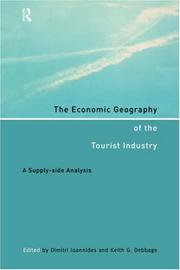| Listing 1 - 5 of 5 |
Sort by
|
Book
ISBN: 9781800377677 1800377673 Year: 2022 Publisher: Cheltenham Edward Elgar Publishing
Abstract | Keywords | Export | Availability | Bookmark
 Loading...
Loading...Choose an application
- Reference Manager
- EndNote
- RefWorks (Direct export to RefWorks)

ISBN: 0415164125 0415164117 0203399889 1134712502 128002013X 0203398424 0429230842 1134712499 9780415164122 9780415164115 Year: 1998 Publisher: London Routledge
Abstract | Keywords | Export | Availability | Bookmark
 Loading...
Loading...Choose an application
- Reference Manager
- EndNote
- RefWorks (Direct export to RefWorks)
The Economic Geography of the Tourist Industry bridges the gap between tourism research and economic geography by bringing together leading academics in geography, planning and tourism. The authors explain tourism's definitions and examine whether tourism can be categorized as an industry. They provide detailed analyses of key sectors, such as tour operators, airlines and the hotel industry from a broad international perspective. The book also explores issues such as business cycles, labour dynamics, entrepreneurship and the role of the state in tourism and concludes that the producti
Tourism. --- Holiday industry --- Operators, Tour (Industry) --- Tour operators (Industry) --- Tourism --- Tourism industry --- Tourism operators (Industry) --- Tourist industry --- Tourist trade --- Tourist traffic --- Travel industry --- Visitor industry --- Service industries --- National tourism organizations --- Travel --- Economic aspects --- Economic geography. --- Tourist trade. --- Earth & Environmental Sciences --- Travel & Tourism --- Toerisme Sport Recreatie. --- Service industries. --- Economic geography --- Industries --- Geografie --- Economische geografie --- Toerisme
Book
ISBN: 1135241309 1135241317 1282443836 9786612443831 0203864654 Year: 2010 Publisher: Milton Park, Abingdon, Oxon ; New York : Routledge,
Abstract | Keywords | Export | Availability | Bookmark
 Loading...
Loading...Choose an application
- Reference Manager
- EndNote
- RefWorks (Direct export to RefWorks)
The United States continues to provide opportunities for travel and tourism to domestic and international travellers. This is the first book to offer students a comprehensive overview of both tourism and travel in this region, paying specific attention to the disciplines of Geography, Tourism Studies and, more generally, Social Science.Tourism in the USA explains the evolution of tourism paying attention to the forces that shaped the product that exists today. The focus of the book includes the manner in which tourism has played out in various contexts; the role of fe
Dissertation
Year: 2017 Publisher: Leuven KU Leuven. Arenberg doctoral school of science, engineering & technology
Abstract | Keywords | Export | Availability | Bookmark
 Loading...
Loading...Choose an application
- Reference Manager
- EndNote
- RefWorks (Direct export to RefWorks)
Summary Tropical deforestation has strong impacts on many ecosystem services such as global climate regulation, preservation of biodiversity and regulation of sediment and water fluxes.Solutions for regional development questions are increasingly sought in cross-border cooperative arrangements. The tourism sector is often assigned with a high potential in this regard due to the sector’s alleged contributions to the economic viability and quality of life in rural destinations, and the assumed ease with which cross-border tourism projects can be initiated. However, the underlying mechanisms behind tourism-related regional development processes in cross-border settings remain poorly understood. Combining tourism geographies, border studies and regional science, we I aim to fully understand the structural delivery mechanisms for tourism-induced regional development in European borderland contexts. First, we I conceptually and empirically explored the interactions between (holistic) landscapes, tourism landscapes, and regional development in rural destinations. Our findings indicate that tourism-related regional development depends not so much on optimizing individual activities and actions. Rather, regional development processes depend on interconnecting all emplaced tourism-related stakeholders, resources and activities within the wider regional system through multi-level governance. Destination-wide provision of institutional support for, and coordination with, local networking agencies such as community and entrepreneurial organizations provide a practical strategy to increase the socially and spatially integrative position of tourism in region-building processes. Second, we I applied and refined these insights to European borderland contexts. Building on empirical research in transnational and within-country borderlands in Belgium, Germany and the Czech Republic, we I found that even though cross-border tourism project development shows to be relatively straightforward in most regions, there is no automatic one-to-one relation between tourism development and regional development. In absence of integrative institutional structures and inability of institutional brokers, uncoordinated cross-border tourism project development may even lead to asymmetrical development between borderlands. Establishing cross-border tourism governance and coordination mechanisms to avoid these outcomes is complicated by both sector-specific and more general border-related complexities. Potential facilitators for cross-border tourism cooperation, such as the presence of cross-border identity and historical connections, may indeed ease this process but cannot work miracles when administrative borders are institutionally hard. To summarize, borderlands tourism can indeed function as a tool for transnational and within-country cross-border regional development, but its complexity can be easily underestimated.
Book

ISBN: 9781845415686 9781845415693 9781845415709 9781845415716 9781845415723 Year: 2016 Publisher: Bristol, UK Blue Ridge Summit, PA
Abstract | Keywords | Export | Availability | Bookmark
 Loading...
Loading...Choose an application
- Reference Manager
- EndNote
- RefWorks (Direct export to RefWorks)
Tourism. --- Hospitality industry --- Tourisme --- Accueil (Tourisme) --- Peer-to-peer travel. --- Independent travel. --- Glocalization. --- Glocalisation --- Globalization --- Target marketing --- Service industries --- Travel --- Technological innovations. --- P2P travel --- Peer-to-peer tourism --- Social travel (Peer-to-peer) --- Peer-to-peer travel --- Independent travel --- Glocalization --- Technological innovations
| Listing 1 - 5 of 5 |
Sort by
|

 Search
Search Feedback
Feedback About UniCat
About UniCat  Help
Help News
News